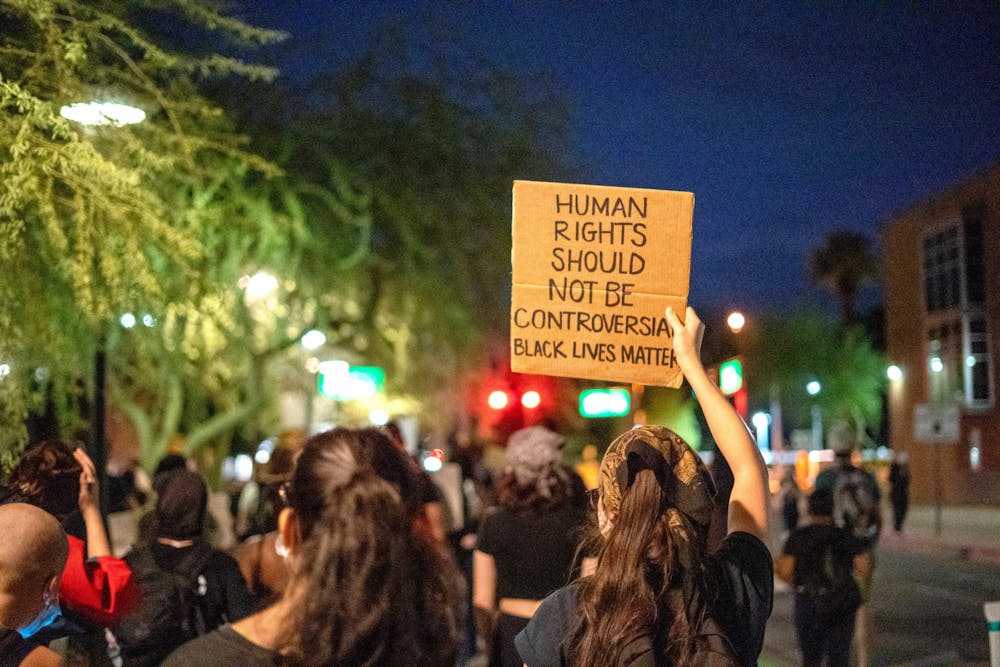White Americans have laid the bulk of the work and burden of fighting for racial justice on members of BIPOC groups for far too long. We do not assume responsibility, rather, we succumb to a fallacy of neutrality by excusing ourselves from taking an active role in the fight against racism.
In this fight for justice, there is no neutral ground. There is no way to exist as simply "not racist."
Ibram X. Kendi, in his bestselling book "How To Be An Anti Racist," said there is no such thing as "not racist" and the opposite of "racist" is actually "anti-racist."
The fight to ensure everyone in this country is treated fairly is far from over, and we've made progress not through neutrality or passiveness, but through active and sometimes aggressive action.
The current status quo in America promotes many disparities. For example, a Black person is more likely to be pulled over without just cause, more likely to be incarcerated, more likely to be killed by police and more likely to have their police abusers exonerated, according to the NAACP.
Changing the status quo — a construction rife with disparity — requires action.
Through this lens, being neutral is no different than being actively racist, because both courses of action result in greater racial disparities.
Acceptance of this idea is difficult, and I am fully willing to admit I initially struggled with accepting it, because it would require me to recognize my inaction had actually caused harm to marginalized communities.
Dr. Kristina Knowles, an assistant professor at the School of Music, Dance and Theatre, believes this acceptance is the first step to promoting anti-racist work.
"I think the first (step) is being honest and open about the fact that our field has a history of racism … racism in the form of celebrating whiteness to the exclusion of Blackness," Knowles said.
White students and faculty must take steps to actively promote diversity and equality, while striving to close disparities where they encounter them.
Knowles said she recently rewrote the second-year music theory curriculum to address these exact issues.
"I am making an effort to include more BIPOC composers in the curriculum, making space for BIPOC voices and music, and most critically, making sure that this music is being treated on its own terms," she said.
This response promotes change in a field which is historically dominated by white people, and is an example of an action promoting anti-racism.
It can be difficult to begin these changes because there are real institutional barriers to diversity and equality.
"We need to acknowledge that this is a collective effort," Knowles said. "(We should) consider this to be a part of the work of a university, and part of the work for faculty."
Pressure from students is also an important part of the process, and Knowles said "the school of music is heading in this direction because of a letter written by graduate students."
The fight for justice was prominently displayed this summer, with Black Lives Matter demonstrations prompting diversity initiatives from many groups, but it is important for this work to be constant in our communities and institutions for lasting changes to be made.
"I would like to think that in five to 10 years it will be different, with a consistent push from students, from faculty … to put pressure on institutions," Knowles said. "For me, to be anti-racist is to be dissatisfied with the status quo."
To change a status quo which is actively racist, one cannot be neutral. To be neutral is to have taken the side of the oppressor, and there is no place for this type of moderation in our society.
One cannot remain neutral in the fight for justice and claim to be "not racist." This is a fallacy that does not exist, and one must overcome their self-absorbed fantasies to accept that it can never exist.
The only way to ensure equality will be found in the future is to keep fighting for it in every area of our lives.
Reach the columnist at tkgerald@asu.edu or follow @TKGeraldMusic on Twitter.
Editor’s note: The opinions presented in this column are the author’s and do not imply any endorsement from The State Press or its editors.
Want to join the conversation? Send an email to opiniondesk.statepress@gmail.com. Keep letters under 500 words and be sure to include your university affiliation. Anonymity will not be granted.
Like The State Press on Facebook and follow @statepress on Twitter.
Continue supporting student journalism and donate to The State Press today.




